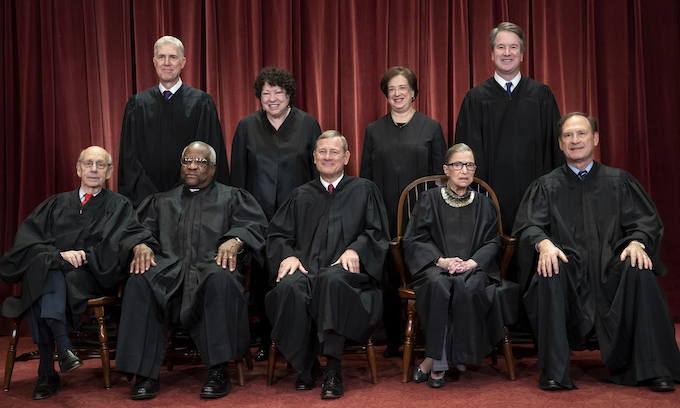A legal expert with The Heritage Foundation says Supreme Court justices have never been given the power to create a right or to modify laws approved by Congress – yet “that’s exactly what happened” this week.
Criticism continues for the U.S. Supreme Court, after a majority of justices ruled that a 1960s civil rights law covers “sexual orientation” and “gender identity.” In a 6-3 decision, the Court ruled on Monday that the word “sex” in Title VII of the 1964 Civil Rights Act includes sexual orientation and gender identity. Writing for the majority, Justice Neil Gorsuch stated:
“An employer who fires an individual for being homosexual or transgender fires that person for traits or actions it would not have questioned in members of a different sex. Sex plays a necessary and undisguisable role in the decision, exactly what Title VII forbids.”
Hans von Spakovsky is a senior legal fellow for The Heritage Foundation, a center-right think tank headquartered in Washington, D.C.
“It’s one thing for them to uphold a recognized right, like the Second Amendment, which makes it clear that Americans have the ability to bear arms,” he tells OneNewsNow. “But it’s quite another for them to simply create a right which they don’t have the power to do – and that’s exactly what happened in this case.
“These are unelected judges,” Spakovsky continues. “They don’t have the power and shouldn’t be rewriting legislation passed by Congress – and again, that’s exactly what they did in this case.”
Justice Brett Kavanaugh, one of the three dissenters, said as much in his opinion. While lauding the “extraordinary vision, tenacity, and grit” of the LGBT community for working “hard for many decades to achieve equal treatment in fact and in law,” Kavanaugh wrote that “it was Congress’ role, not this Court’s, to amend Title VII.”
Justice Gorsuch, however, saw things differently, as demonstrated in his 33-page majority opinion. Spakovsky admits he was shocked.
“[Gorsuch] says that he’s a textualist and he’s just applying the exact language that’s in the law, [and] textualism means you apply the language in the statute under its common understanding at the time the law was passed,” Spakovsky explains.
“Well, the common understanding of the law and the word ‘sex’ at that time referred to the two biological sexes, males and females; and the common understanding was not that it applied to sexual orientation or transgender individuals.”
Spakovsky adds that recent efforts by members of Congress to amend Title VII through the Equality Act and similar measures prove that people recognized sexual orientation and gender identity were not included in the term “sex” as outlined in Title VII.
“Those who are in the LGBT community who are criticizing the dissenters should read their dissents more closely – because it’s not that they are somehow against that particular community, it’s just that they’re saying this decision should not have been made by judges,” Spakovsky explains. “It should have been made by Congress.”
Related column co-authored by Hans von Spakovsky:
Gorsuch helps transform the Supreme Court into the supreme legislature on LGBT rights
A proverbial ‘can of worms’?
An attorney who argued this case before the Supreme Court maintains it is definitely going to impact the sports world.
“It’s going to be litigated for sure,” said attorney John Bursch of Alliance Defending Freedom (ADF) in a press call. “Now that the Court has announced that ‘sex’ includes gender identity and sexual orientation, you can be sure that those same arguments are going to be advanced in Title IX and other areas over and over again.”
Bursch added that that battle is already playing out to some extent in the space of women’s athletics.
“There are the three women in Connecticut who filed a Title IX lawsuit in federal court because two boys identifying as girls have won 15 girls’ state track and field titles over the past three years,” Bursch explained. “When those girls’ parents complained to the Title IX officers about the unfairness of that situation, they were told that girls have the right to participate but they don’t have the right to win. So, certainly that’s going to be an area that’s litigated.”
ADF represented a Michigan funeral home owner in the Supreme Court case that determined the word “sex” in civil rights law includes gender identity and sexual orientation. Thomas Rost, that owner, dismissed a now-deceased male employee – hired as a funeral director – who informed Rost that he wanted to present as a woman.
“Harris Funeral Homes has professional conduct and dress codes to ensure that the grieving families it serves can focus on healing and not on the funeral home or its employees,” ADF describes in a webpage about the case. “Ultimately, Tom Rost – owner of Harris Funeral Homes – decided he could not agree to the funeral director’s plan, and they parted ways.”
Rost maintained he was within his rights.
—-
Copyright American Family News. Reprinted with permission.


















Recent Comments